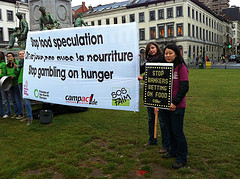 |
| Picture Credit: World Development Movement |
Germany's fourth largest bank, DZ Bank, and its subsidiary Union Investment, have announced that they will no longer engage in speculation with agricultural commodities, according to the NGO foodwatch. DZ Bank confirmed this through a letter sent to foodwatch. DZ Bank is the latest of a number of institutes which have announced their decision to stop the process of food speculation.
MAY 13, 2013 | FOODWATCH
Speculation with Foodstuffs: DZ Bank and Union Investment Back Out
The cooperative DZ Bank and its subsidiary, the investment company Union Investment, are withdrawing entirely from speculation with agricultural commodities. DZ Bank, the central institution for more than 900 cooperative banks, confirmed this to foodwatch in a letter.
In the letter dated May 13, 2013, DZ Bank CEO Lars Hille also pleaded for tighter regulation of agricultural commodity markets, in particular “through the introduction of effective position limits on stock exchanges or central clearing platforms”. On the basis of such position limits – as demanded by foodwatch as well – the amount of traded contracts on the commodity futures markets would be restricted to prevent excessive speculation. In order to be able to enforce restrictions of that kind on trade volumes for trade outside stock exchanges, for what is called the “over-the-counter” business (OTC), DZ CEO Hille further demands measures to create more transparency: “We support all efforts to, in principle, transact derivatives – such as futures contracts on agricultural commodities – through stock exchanges, or, in the case of OTC derivatives, through central clearing platforms, to ensure more transparency and minimize trade partner risk.”
With this move made by DZ Bank, another large bank backs out of the speculation with foodstuffs. DZ Bank’s decision demonstrates social responsibility above all because the bank is advocating the necessary political regulation of commodities futures markets at the same time. Controlling trade volumes through effective position limits, as demanded by DZ Bank, is the basic prerequisite to prevent excessive speculation, and thus hunger crises. This should serve as an example to all other institutes which are thwarting all efforts at the indispensable political regulation of financial markets by all means necessary – above all Deutsche Bank.
Since the publication of the foodwatch report “The Hungermakers” in October of 2011, foodwatch has been calling on banks to cease all speculative transactions of agricultural commodities in order to eliminate the risk of speculative price peaks of foodstuffs. With Commerzbank, Landesbank Baden-Württemberg (LBBW), Landesbank Berlin (LBB), the DekaBank of mutual savings banks, and now the DZ Bank and Union Investment, the list of „dropouts” out of foodstuffs speculation is getting ever longer. This notwithstanding, Deutsche Bank, as the biggest German player in this field, announced its decision at the start of the year to continue trading products which bet on price developments of agricultural commodities.
As early as January, DZ Bank and Union Investment had already announced that they would not actively trade products based on price developments of agricultural commodities “until further notice”. In a personal meeting with foodwatch executive director Thilo Bode, DZ CEO Lars Hille explained the decision in detail, which he confirmed in the letter to foodwatch of May 13. In the letter, DZ Bank states its intent to let securities based on agricultural commodities expire in 2013. Subsequent products would not be issued, while other banks’ agricultural derivatives would not be traded either. Products lacking an expiration date had already been removed from the stock exchange or been terminated with notice to June 3. Furthermore, the “Akzent Invest Fonds BestPortfolio” issued by DZ Bank would be rearranged in a way that it would no longer invest in agricultural commodities. In the future, the products of subsidiary Union Investment will completely abandon investments in agricultural commodities as well.
DZ Bank acts as the central institution for more than 900 cooperative and so-called Raiffeisen, Sparda and PSD banks. The DZ Bank Group is the fourth largest financial institution in Germany, after Deutsche Bank, Commerzbank and the state-owned Reconstruction Credit Institute (KfW).
Spekulation mit Nahrungsmitteln: DZ Bank und Union Investment steigen aus
